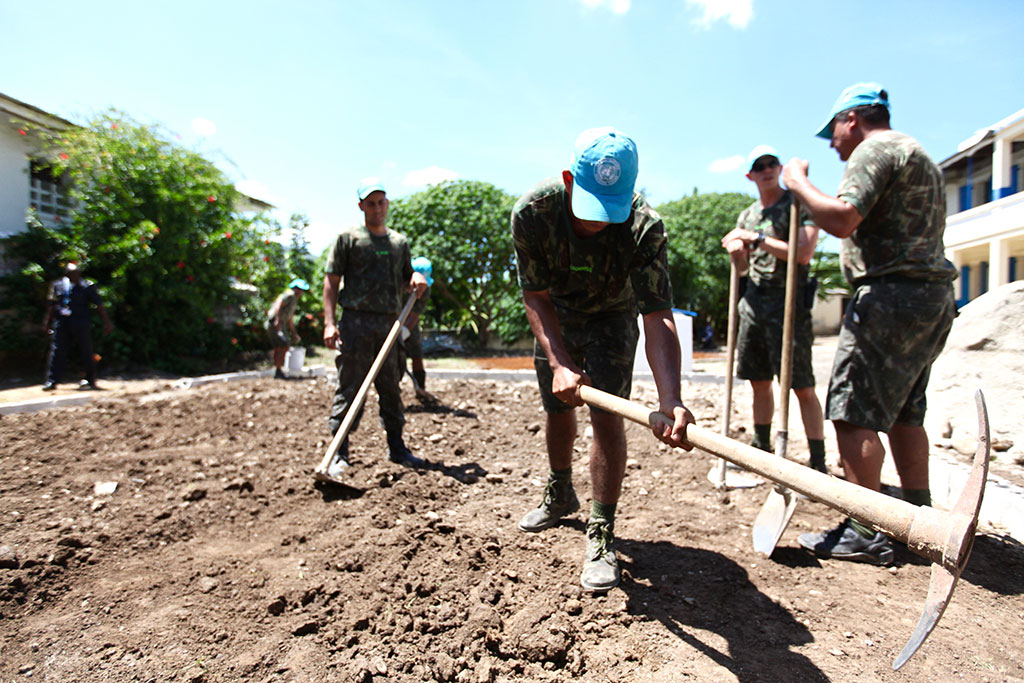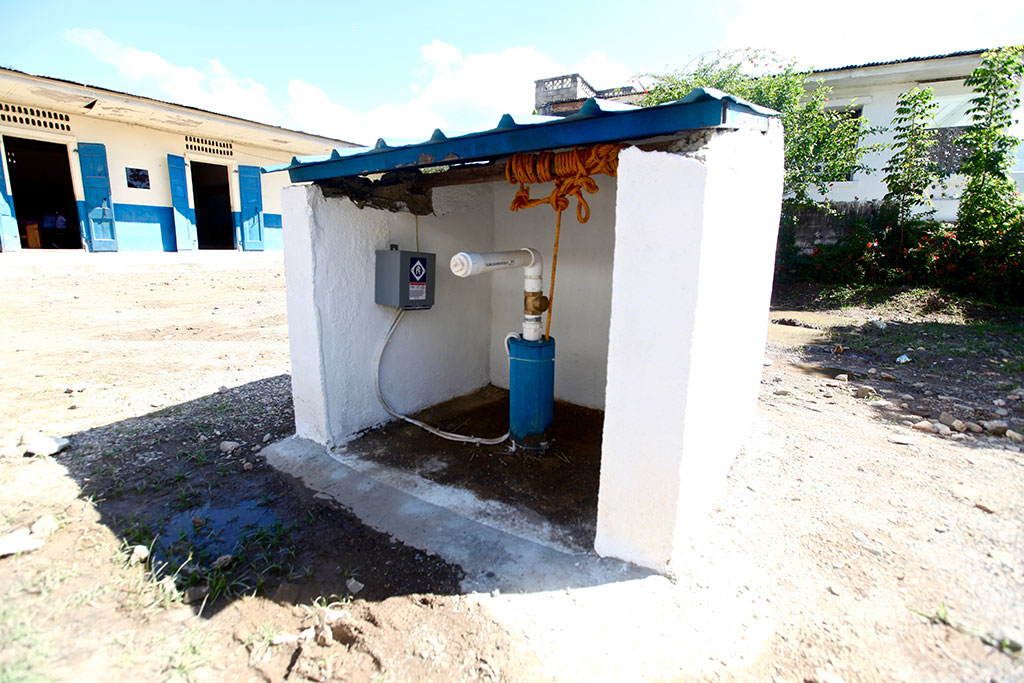FEATURE: Political differences, a dozen peacekeepers and two new wells in northern Haiti
Residents in Pilate, a remote town of some 40,000 inhabitants located on a mountain in northern Haiti, were treated to an unusual site recently: uniformed, foreign men hard at work laying concrete foundations for a well near the local hospital and school.
Local inhabitants had become resigned to a deficient water supply for months following political confrontations that led to the existing water supply system being sabotaged in December.
“There was a division between the two political parties and, to punish the population of the town, one of them cut the water supply to the community,” the Executive Director of the Hôpital L’Espérance in Pilate, Sister Louisa Bélanger.
The sabotage meant that residents would have had to rely on external water supplies in an already difficult-to-access location, with the Plaisance Arrondissement – the region Pilate is located in – known for its mountainous terrain and poor road networks. This development worsened an already dire situation in Pilate, which the authorities had identified in November 2015 as one of 15 communities under “red alert” status for the country’s cholera outbreak.
Coinciding with International Water Day on 22 March, a group of United Nations officials, led by the Secretary-General’s Deputy Special Representative for Haiti, Mourad Wahba, had visited Pilate to meet representatives from the local authorities and community groups to evaluate the town’s needs following the sabotage.
Mr. Wahba was accompanied by representatives from the UN Children’s Fund (UNICEF), the UN World Health Organization (WHO) and the UN Office for the Coordination of Humanitarian Affairs (OCHA), as well as specialists from the UN Stabilization Mission in Haiti (MINUSTAH).
“We are ready to help you with the water supply – but we ask for vigilance for the system’s long-term viability,” Mr. Wahba, who also serves as the world body’s Resident and Humanitarian Coordinator in Haiti, said during the visit. “Civic awareness from the residents of Pilate is fundamental in this respect.”
Along with others, such as the town’s mayor and representatives of non-governmental organizations, Sister Louisa met with the UN officials and asked for their assistance.
The Humanitarian Coordinator committed to support the town and asked the local authorities to propose a plan for the management and protection of a new water system, as well as a second plan with proposals for the wider development of the town. While those plans were being prepared, as an emergency measure, MINUSTAH transported water by truck to the community, particularly for usage by the local hospital and school.
MINUSTAH has helped us greatly – they’re the ones who have supplied the water
“MINUSTAH has helped us greatly – they’re the ones who have supplied the water,” said Sister Louisa. “MINUSTAH arrived with water trucks two or three times a week, and this water was used to clean the hospital.”
“We even managed a surgical mission of 15 days thanks to the MINUSTAH-supplied water. One hundred and four beneficiaries were operated on during this time,” she added.
According to the hospital administrator, at the height of the Pilate’s cholera outbreak – between November 2015 and January 2016 – around 30 to 40 cases could be treated simultaneously thanks to the UN mission’s truck-borne water supply.
And, at their meeting, Mr. Wahba agreed to a separate request from Sister Louisa for two new wells – built by MINUSTAH engineers – to improve the water supply for the hospital and the school.
“I was ready,” said Sister Louisa. “I had my documents, and Mr. Wahba told me: ‘You will have your well.’”
The project in Pilate has drawn support from across the UN system in the Caribbean country.
“The Secretary-General’s Special Representative for Haiti, Sandra Honoré, is personally engaged to support this project that will improve the access to safe water for the local population,” said MINUSTAH’s spokesperson, Ariane Quentier.
And this is how a dozen Brazilian peacekeepers found themselves in this remote community over recent days, laying the concrete foundations and structure to protect the well’s water basin, a generator and a water pump, as well as digging two wells, each at least 100 metres in depth.
“Digging a well is straight-forward enough – the more challenging aspect to this was to bring the equipment here,” said Lieutenant Michell Vanderson Sena Leal of MINUSTAH’s Brazilian Engineering Company, which is based in the capital, Port au Prince, located just 220 kilometres from Pilate but a 10-hour journey given tough road conditions.
The move involved transporting 65 tonnes of equipment to the town by a convoy made up of 14 trucks. The peacekeepers have now finished the wells – all that remains is for them to be connected to a water system, which should be completed in the near future, providing Hôpital L’Espérance patients and local school students with an unlimited supply of clean water.
“I asked for a well so as to be more independent from other water sources, and to meet the needs of the patients. If the town’s population is divided [because of political differences], the hospital does not have to be punished for that,” said Sister Louisa. “Under no circumstances should the hospital be affected by political instability, and water should not be affected because water is life.”






